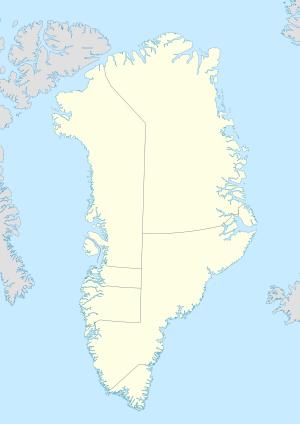Qasigiannguit[2] (Greenlandic pronunciation: [qaˌsiɣiˈaŋːuit]), formerly Christianshåb,[3] is a town located in western Greenland on the southeastern shore of Disko Bay in the Qeqertalik municipality. With 1,081 inhabitants in 2020,[1] it is the thirteenth-largest town in Greenland. The main industry is shrimp and halibut fishing.
Qasigiannguit
Christianshåb | |
|---|---|
 Aerial view of Qasigiannguit | |
| Coordinates: 68°49′12.52″N 51°11′35.67″W / 68.8201444°N 51.1932417°W | |
| State | |
| Constituent country | |
| Municipality | Qeqertalik |
| Founded | 1734 |
| Population (2020) | |
| • Total | 1,081[1] |
| Time zone | UTC−02:00 (Western Greenland Time) |
| • Summer (DST) | UTC−01:00 (Western Greenland Summer Time) |
| Postal code | 3951 |
History
editThe settlement was founded as a trading post for Jacob Severin's company in 1734[4] and named Christianshaab in honor of King Christian VI of Denmark.[5] The name was sometimes anglicized as Christian's Hope.[6]
Paul Egede's former residence is Greenland's oldest surviving wooden building. It was completed on 25 July 1734[7] and moved to its present site in 1806 owing to the heavy wind at its original location across the bay. In 1997, a museum was officially opened in the Egede house. In the summer of 1999, an archaeological discovery provided the museum with a collection of finds from different prehistoric cultures.[8]
Transport
editAir
editDuring the winter, Air Greenland operates air services from the town heliport to Ilulissat, Qeqertarsuaq on Disko Island and Aasiaat.[9]
Sea
editDuring summer and autumn, when the waters of Disko Bay are navigable, communication between settlements is by sea only, serviced by Diskoline.[10] The ferry links Qasigiannguit with Ilulissat, Aasiaat, Ikamiut, Akunnaaq, and Qeqertarsuaq.
Population
editWith 1,081 inhabitants as of 2020, Qasigiannguit is the second-largest town in the Qeqertalik municipality.[1] The town is steadily depopulating, with the population having decreased by more than 27% relative to the 1990 levels and by nearly 17% relative to the 2000 levels.[1]
References
edit- ^ a b c d e "Population by Localities". Statistical Greenland.
- ^ The pre-1973 spelling was Kasigianguit. It is also sometimes written as Qasigianguit.
- ^ The pre-1948 spelling was Christianshaab.
- ^ Marquardt, Ole. "Change and Continuity in Denmark's Greenland Policy" in The Oldenburg Monarchy: An Underestimated Empire?. Verlag Ludwig (Kiel), 2006.
- ^ Del, Anden. "Grønland som del af den bibelske fortælling – en 1700-tals studie Archived July 15, 2012, at the Wayback Machine" ["Greenland as Part of the Biblical Narrative – a Study of the 18th-Century"]. (in Danish)
- ^ i.a., Lieber, Francis & al. Encyclopædia Americana: A Popular Dictionary of Arts, Sciences, Literature, History, Politics and Biography. "Greenland". B.B. Mussey & Co., 1854.
- ^ O'Carroll, Etain (2005). Greenland and the Arctic. Lonely Planet. p. 181. ISBN 1-74059-095-3.
- ^ Museum Archived September 22, 2010, at the Wayback Machine.
- ^ "Booking system". Air Greenland. Archived from the original on 22 April 2010. Retrieved 8 July 2010.
- ^ Diskoline timetable Archived May 22, 2009, at the Wayback Machine
